
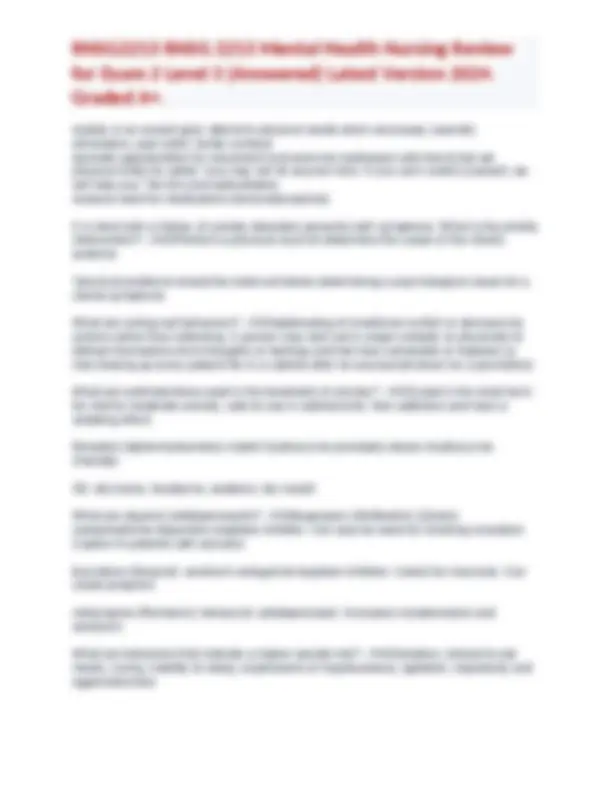
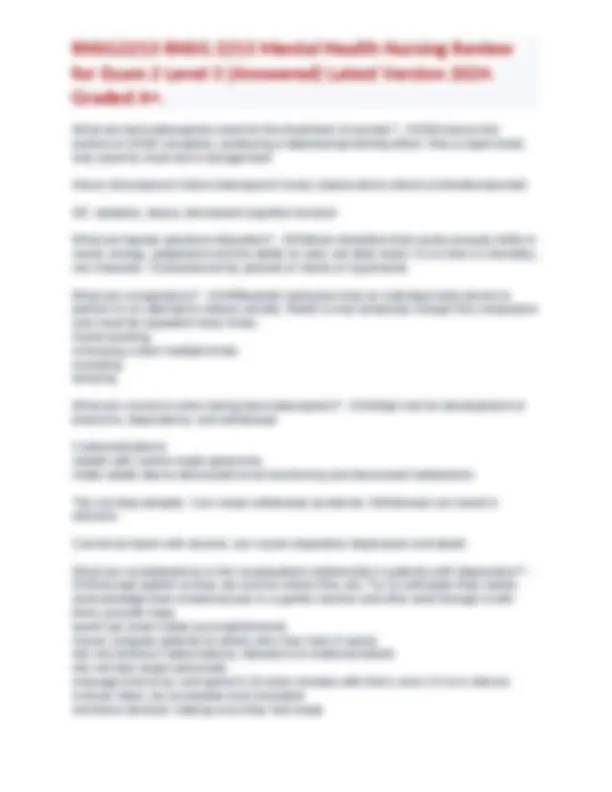
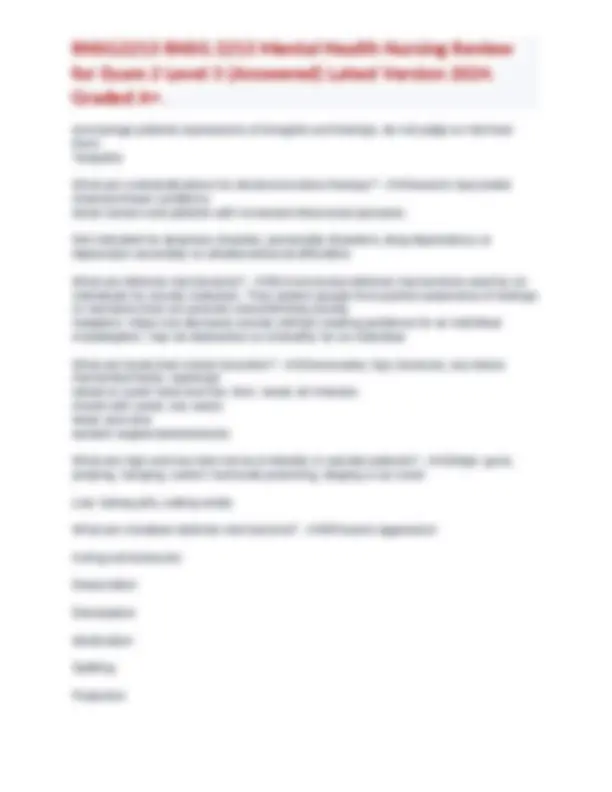
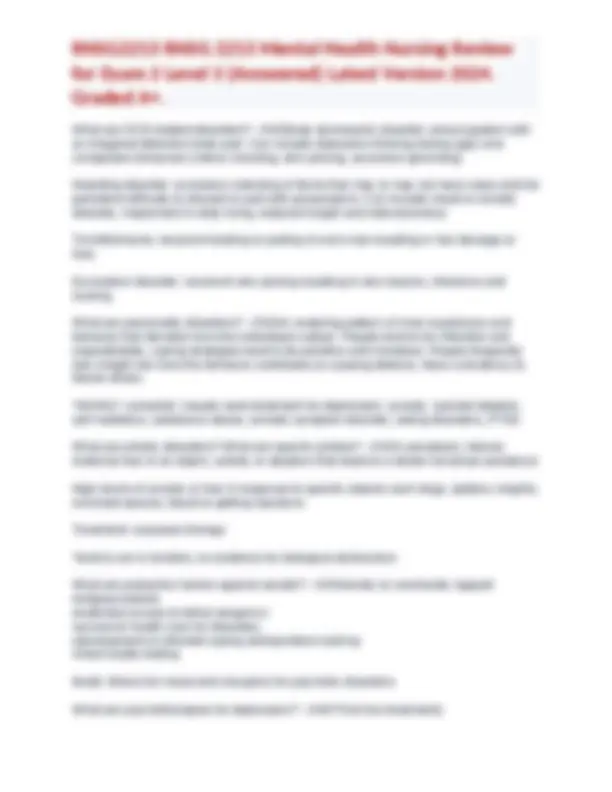
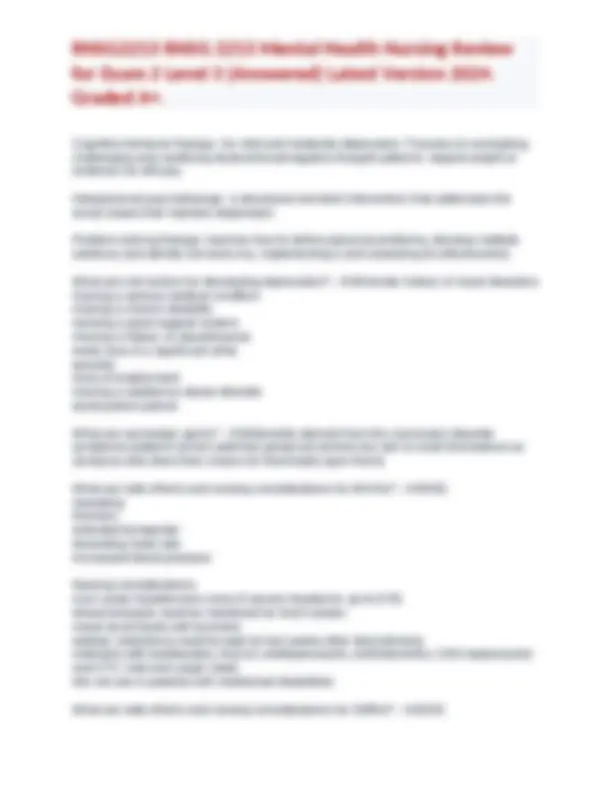
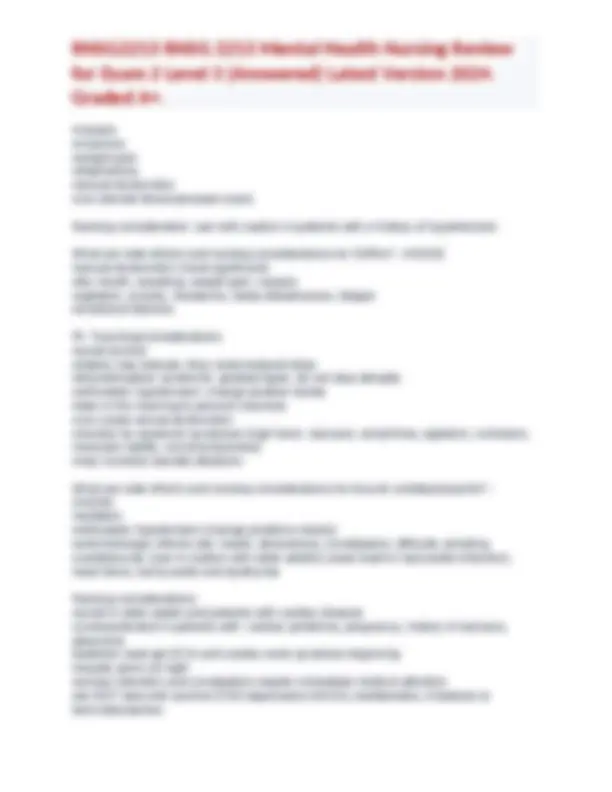
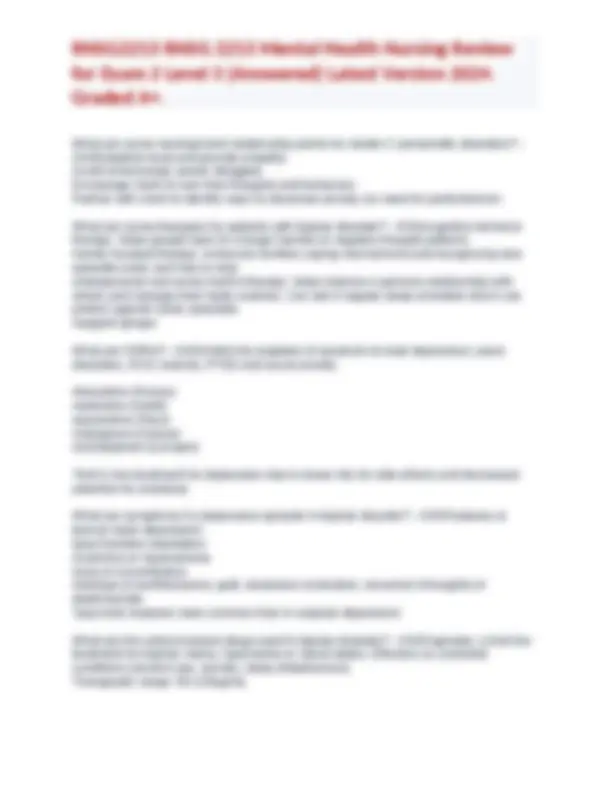
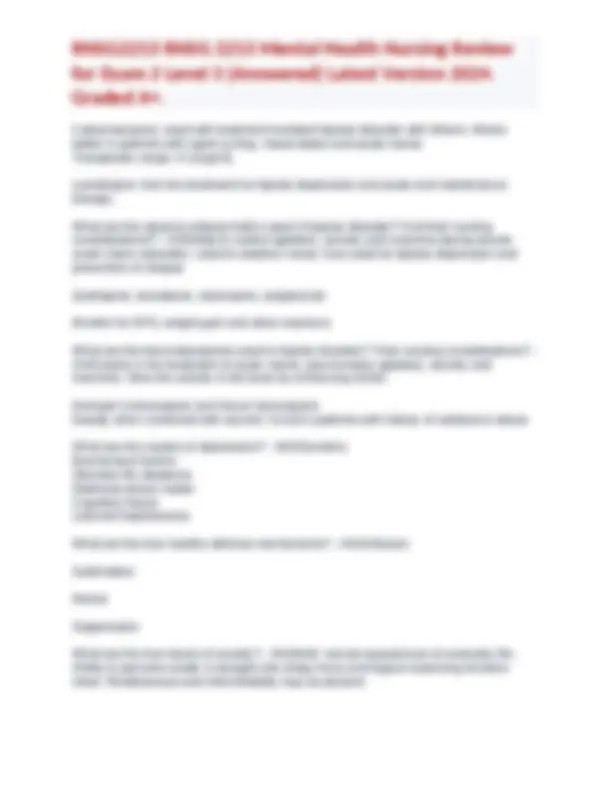
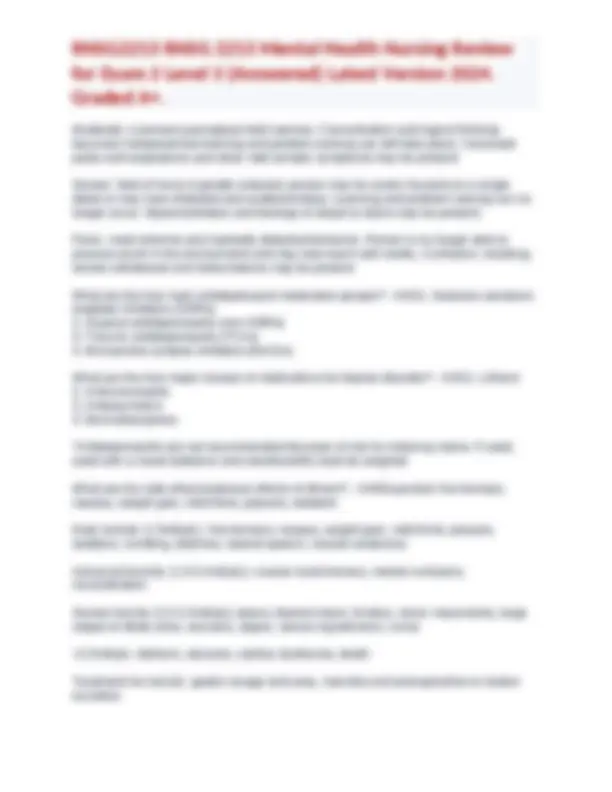
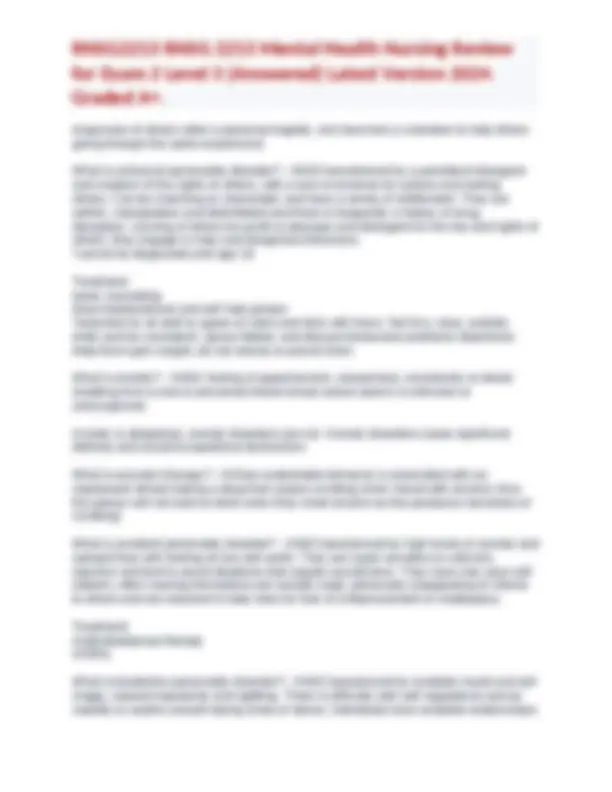
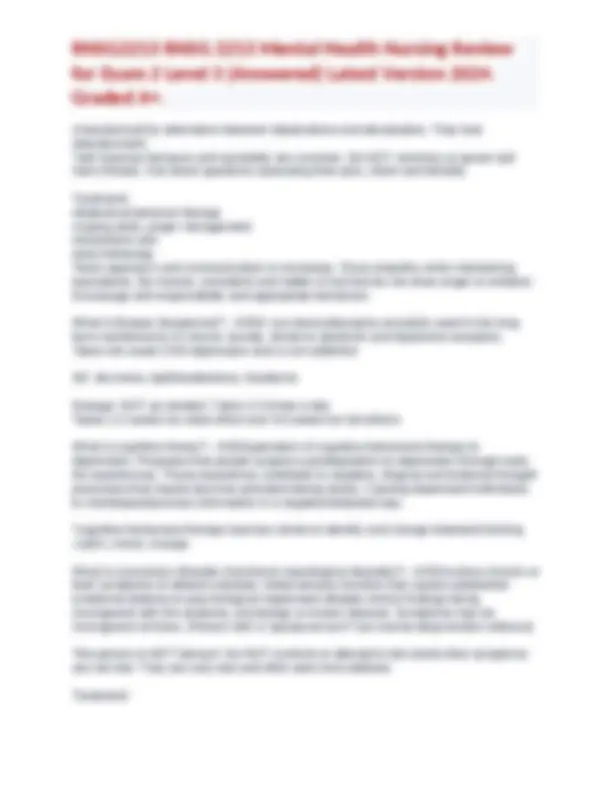
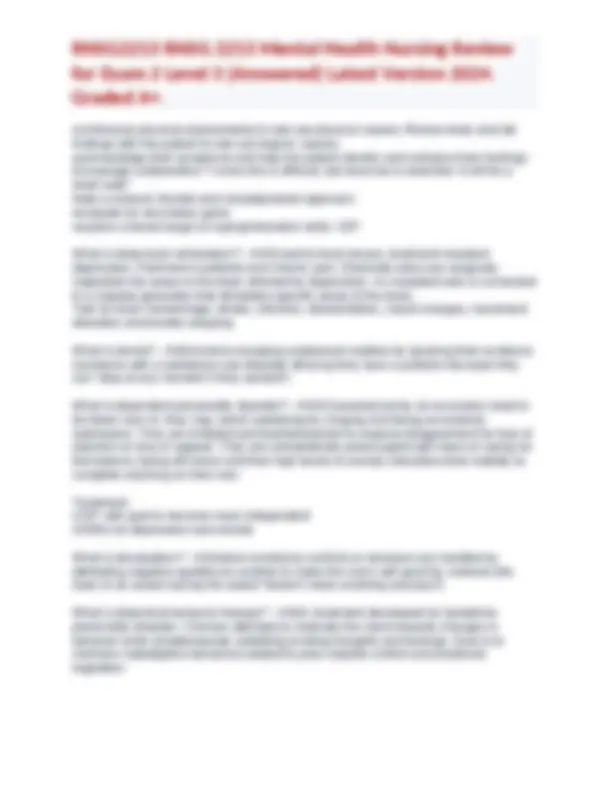
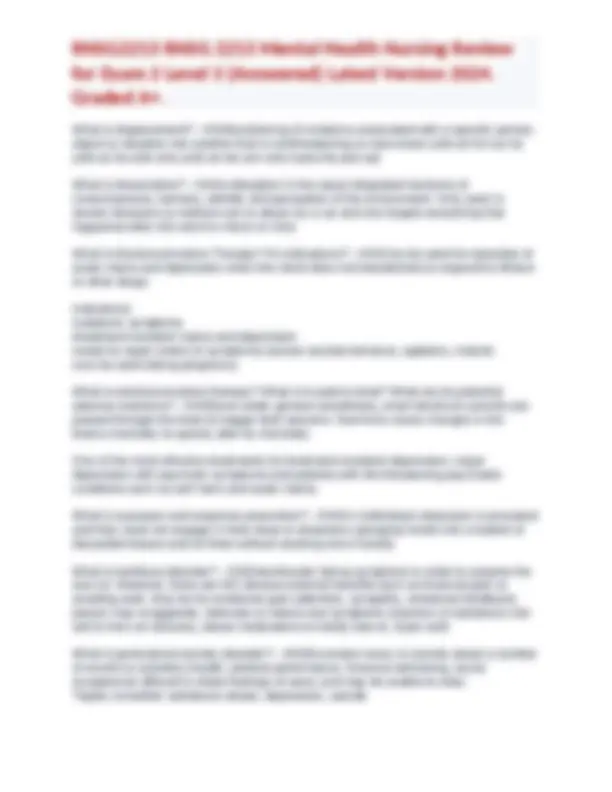
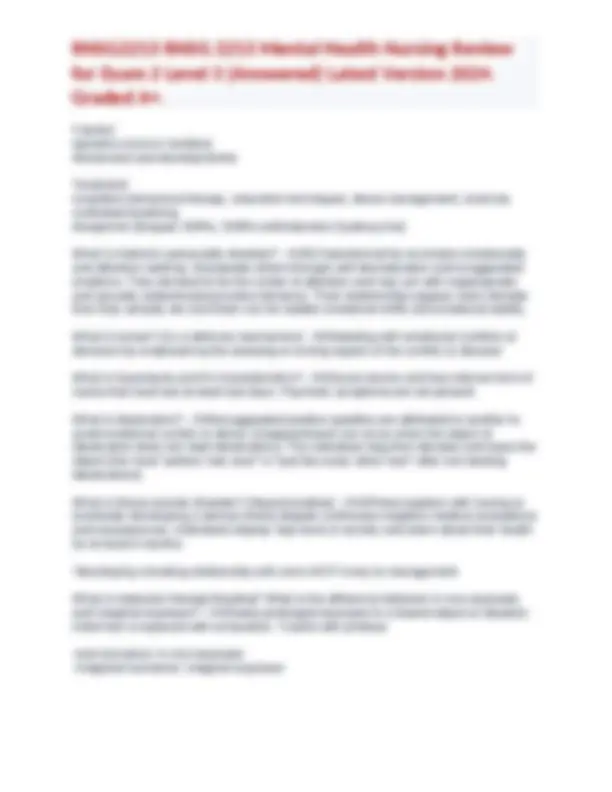
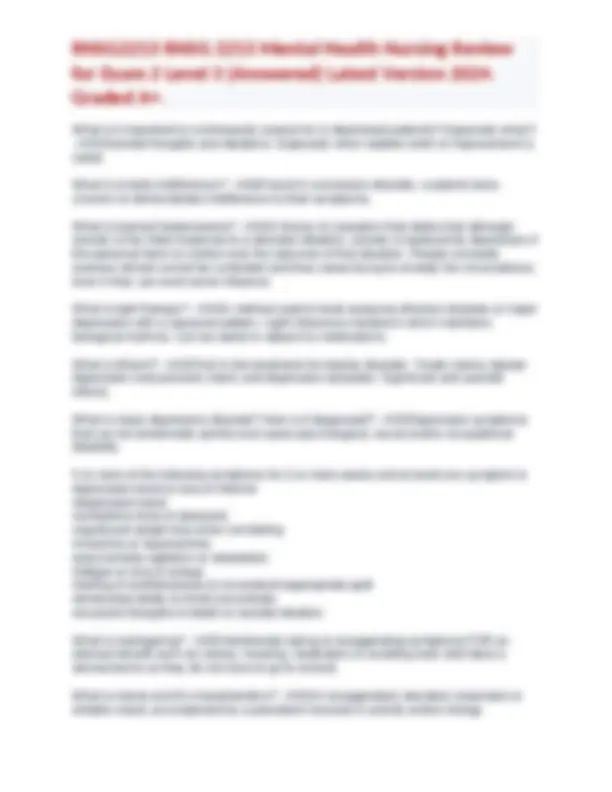
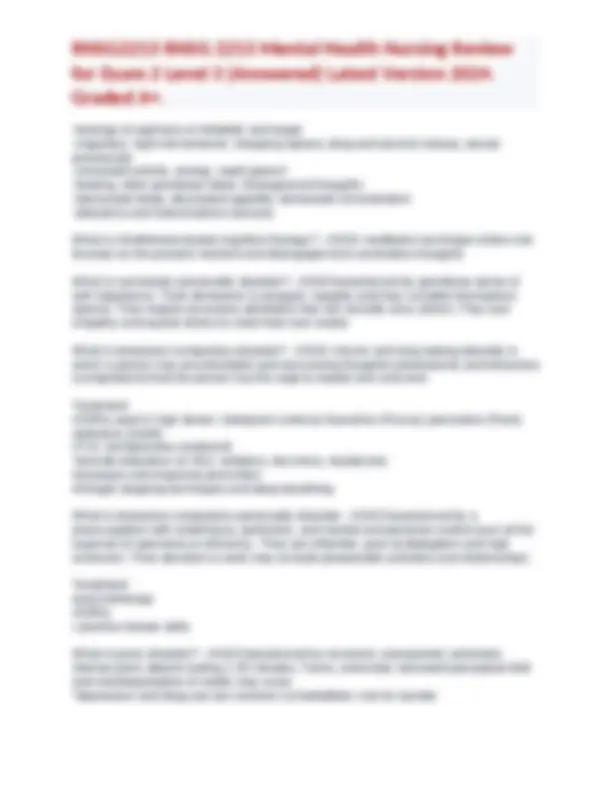
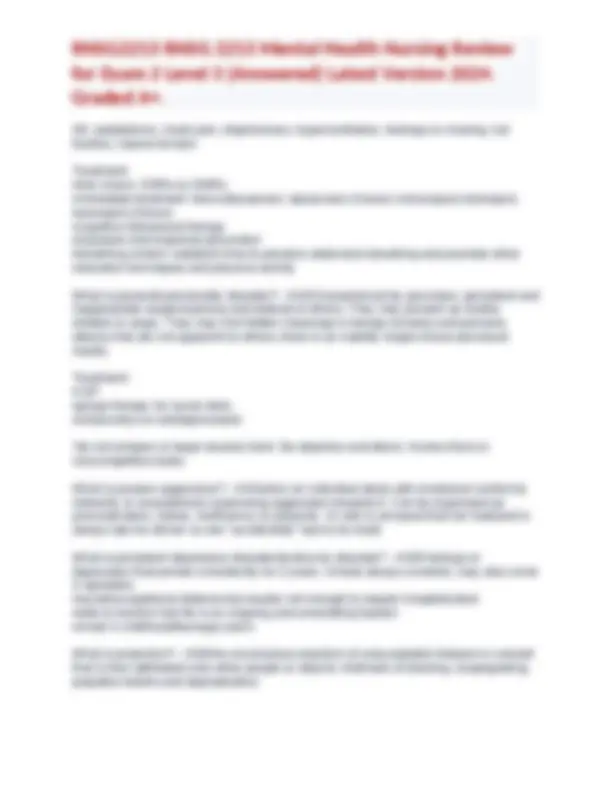
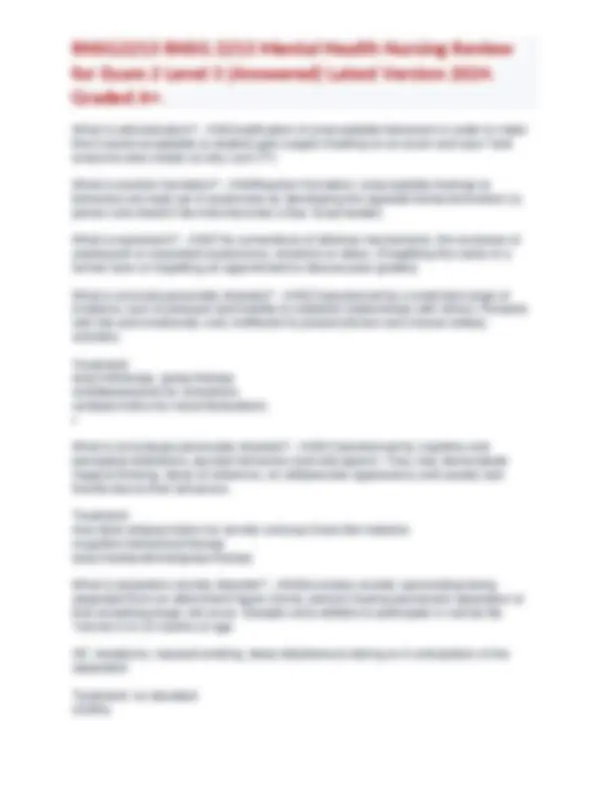
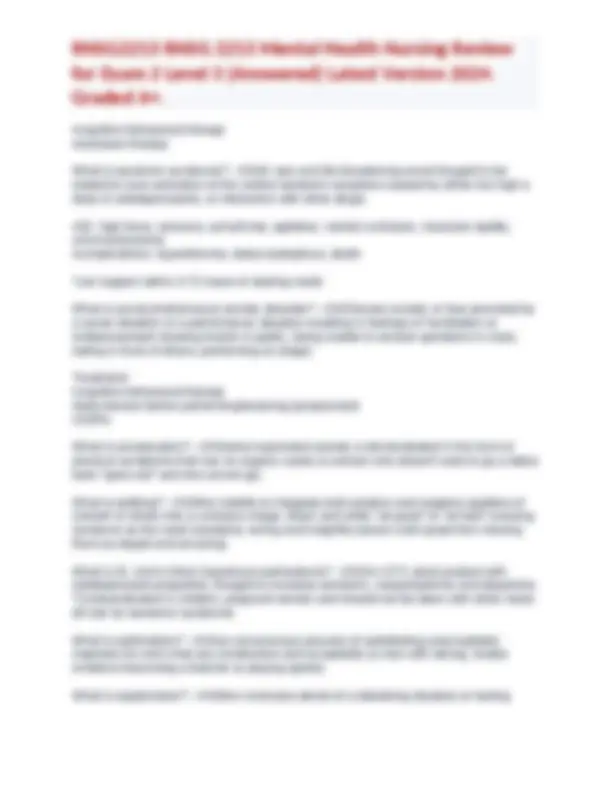
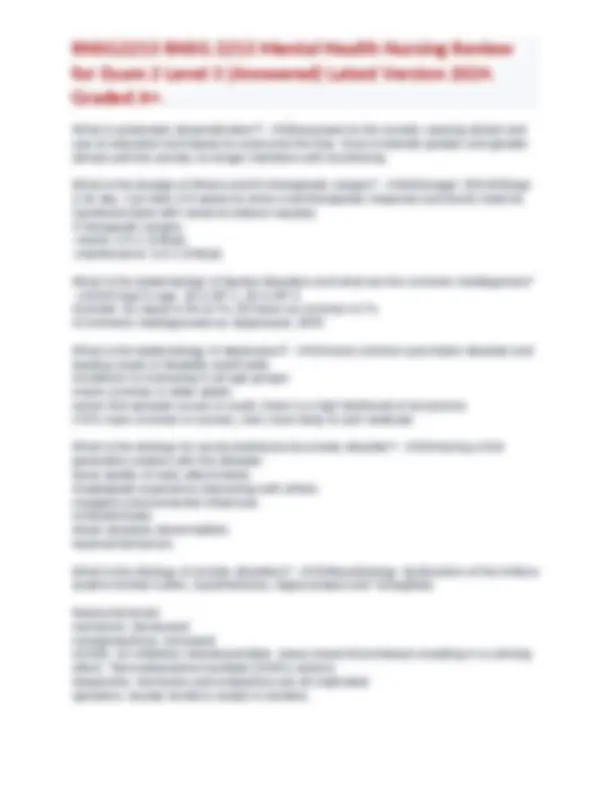
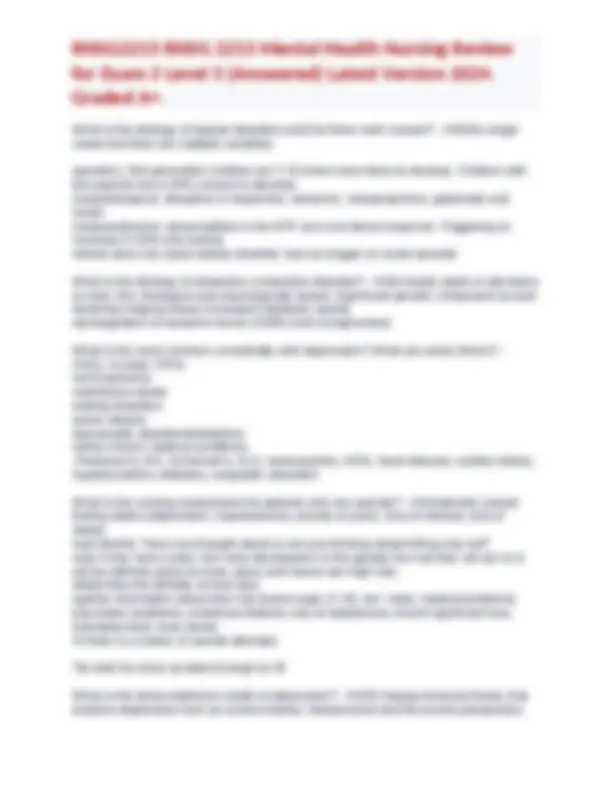
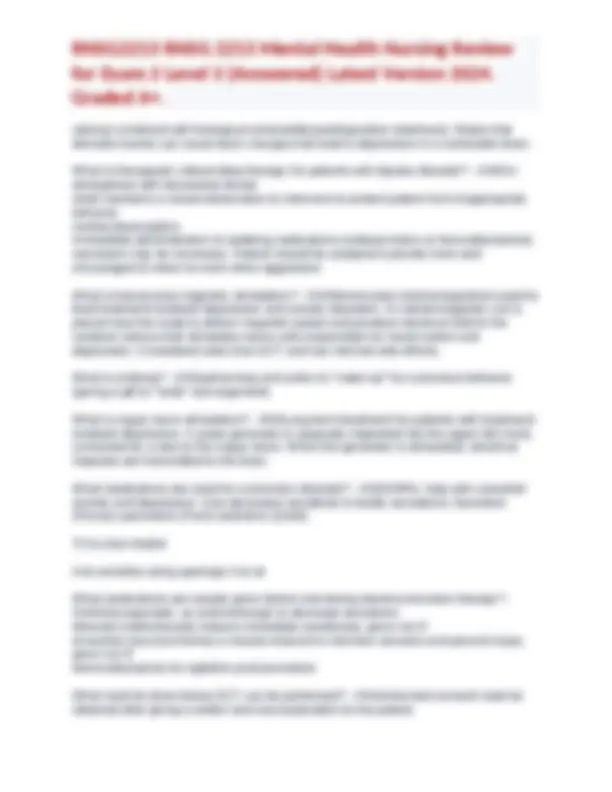
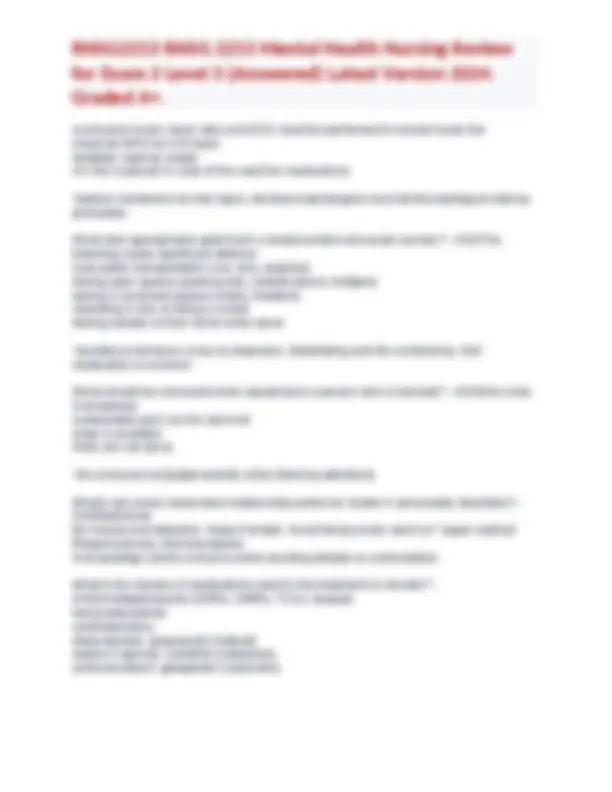


Study with the several resources on Docsity

Earn points by helping other students or get them with a premium plan


Prepare for your exams
Study with the several resources on Docsity

Earn points to download
Earn points by helping other students or get them with a premium plan
Community
Ask the community for help and clear up your study doubts
Discover the best universities in your country according to Docsity users
Free resources
Download our free guides on studying techniques, anxiety management strategies, and thesis advice from Docsity tutors
RNSG2213 RNSG 2213 Mental Health Nursing Review for Exam 2 Level 3 (Answered) Latest Version 2024. Graded A+..docx
Typology: Exams
1 / 31

This page cannot be seen from the preview
Don't miss anything!
























How are anticonvulsants used in the treatment of anxiety? – ANSUsually used in adjunct to other medications, help relieve the symptoms of anxiety Valporic acid, gabapentin (neurontin How are antidepressants used to treat anxiety? - ANSFirst line treatment for anxiety disorders, secondary benefit of treating co-occurring depressive disorders. SSRIs and SNRIs preferred over TCAs as they have less side effects •SSRIs: celexa (citalopram) Lexapro (escitalopram) Prozac (fluoxetine) paxil (paroxetine) zoloft (sertraline) •SNRIs: cymbalta (duloxetine) and Effexor (venlafaxine) •tricyclics: anafranil (clomipramine): for OCD How are beta blockers used in the treatment of anxiety? – ANSUsed for panic disorders and social anxiety. Decreases heart rate, contractility and blood pressure to relieve physical symptoms of anxiety Propranolol (Inderal) How are beta-blockers used in the treatment of anxiety? – ANSBlocks the hormones epinephrine/adrenaline. Decrease heart rate, contractility and blood pressure to decrease somatic feelings of anxiety. Propranolol (Inderal) and atenolol (Tenormin) How do biochemical factors effect depression? – ANSBiochemical factors: changes in the neurotransmitters and the limbic system, hypothalamus, prefrontal cortex, hippocampus and amygdala. Low serotonin and norepinephrine, and dysfunction in glutamate, dopamine, GABA and acetylcholine. *PET scan reveals a less active brain How do genetics effect depression? – ANSinteract with environmental factors, first degree family members are 2-4 times more likely to develop. Increased risk for comorbidity (substance abuse) increased risk for occurrence and earlier onset
How do hormone effect depression? – ANSMany depressed patients have increased levels of cortisol caused by chronic stress *depressed individuals display hyperactivity in HPA axis How do stressful life events effect depression? - ANSEarly life experiences such as harsh/abusive parenting can make a person more psychologically sensitive to rejection and stress. Implications: social separations, job loss, loss of self esteem, death of someone important, extreme poverty How is generalized anxiety disorder diagnosed? - ANSAn individuals symptoms must persist for most days during a 6 month period and have at least three of the following symptoms: •restlessness •fatigue •poor concentration •irritability •muscle tension •sleep disturbances How should you communicate someone who is experiencing mild to moderate anxiety?
What are benzodiazepines used for the treatment of anxiety? - ANSEnhance the actions of GABA receptors, producing a depressing/calming effect. Has a rapid onset, only used for short term management Ativan (lorazepam) Valium (diazepam) Xanax (alprazolam) Librium (chlordiazepoxide) SE: sedation, ataxia, decreased cognitive function What are bipolar spectrum disorders? - ANSBrain disorders that cause unusual shifts in mood, energy, judgement and the ability to carry out daily tasks. It is a flaw in chemistry, not character. Characterized by periods of mania or hypomania What are compulsions? - ANSRitualistic behaviors that an individual feels driven to perform in an attempt to reduce anxiety. Relief is only temporary though this compulsive acts must be repeated many times. •hand washing •checking a door multiple times •counting •praying What are concerns when taking benzodiazepines? - ANSHigh risk for development of tolerance, dependency and withdrawal Contraindications: •adults with narrow angle glaucoma •older adults due to decreased renal functioning and decreased metabolism *Do not stop abruptly. Can cause withdrawal syndrome. Withdrawal can result in seizures Cannot be taken with alcohol, can cause respiratory depression and death What are considerations in the nurse/patient relationship in patients with depression? - ANS•accept patient as they are and for where they are. Try to anticipate their needs •acknowledge their emotional pain in a gentle manner and offer work through it with them, provide hope •point out small visible accomplishments •never compare patients to others who may have it worse •do not reinforce hallucinations, delusions or irrational beliefs •do not take anger personally •manage time to try and spend 5-10 extra minutes with them, even if it is in silence. Actively listen, be accessible and consistent •reinforce decision making once they feel ready
•encourage patients expressions of thoughts and feelings, do not judge or minimize them *empathy What are contraindications for electroconvulsive therapy? - ANS•recent myocardial infarction/heart conditions •brain tumors and patients with increased intracranial pressure. Not indicated for dysphoric disorder, personality disorders, drug dependency or depression secondary to situational/social difficulties What are defense mechanisms? - ANSUnconscious defense mechanisms used by an individuals for anxiety reduction. They protect people from painful awareness of feelings or memories that can provoke overwhelming anxiety •adaptive: helps one decrease anxiety without creating problems for an individual •maladaptive: may be destructive or unhealthy for an individual What are foods that contain tyramine? - ANS•avocados, figs, bananas, soy beans •fermented foods, saurkraut •dried or cured meat and fish, liver, nearly all cheeses •foods with yeast, soy sauce •beer and wine •protein supplements/extracts What are high and low risks forms of lethality in suicidal patients? - ANSHigh: guns, jumping, hanging, carbon monoxide poisoning, staging a car crash Low: taking pills, cutting wrists What are immature defense mechanisms? - ANSPassive aggression Acting-out behaviors Dissociation Devaluation Idealization Splitting Projection
development of aseptic meningitis (fever, chills, photophobia, headache, stomachache, stiff neck) What are nursing considerations for lithium? - ANS•blood levels are drawn before first morning dose (10-12 hours after the last dose) •should be taken with meals to reduce nausea •usually contraindicated with renal disease, thyroid disease, cardiovascular disease and in pregnancy •major long terms side effects: hypothyroidism and kidney impairment to concentrate urine •the body cannot distinguish between lithium and sodium (inverse relationship) decreased sodium increases lithium and increased sodium decreased lithium. Do not take diuretics or NSAIDS. Stop taking if experiencing diarrhea, vomiting or sweating. What are nursing considerations when administering benzodiazepines to patients with anxiety disorders? - ANS•avoid in patients with history of drug/alcohol use/abuse •avoid caffeine or stimulants when taking What are nursing considerations when working with a client with obsessive compulsive disorder? - ANS•give the patient time to perform rituals by creating a schedule •speak to them in a calm, non authoritarian manner •help them verbalize stressors and their feelings •help guide them through other anxiety reducing behaviors as opposed to their obsessions and rituals •provide simply tasks and activities to refocus What are nursing considerations when working with a patient with a phobic disorder? - ANS•accept the patients fears with a noncritical attitude •encourage the patient to verbalize their fears •discuss the reality of the situation •do NOT force the patient to be in contact with the object or put themselves into the situation •teach and practice relaxation techniques What are obsessions? - ANSThoughts, impulses or images that persist and recur so they cannot be dismissed from the mind. They are often senseless but still cause anxiety. •hurting a loved one •fear of contamination •needing things to be symmetrical
What are OCD related disorders? - ANSBody dysmorphic disorder: preoccupation with an imagined defective body part. Can include obsessive thinking (being ugly) and compulsive behaviors (mirror checking, skin picking, excessive grooming) Hoarding disorder: excessive collecting of items that may or may not have value and the persistent difficulty to discard or part with possessions. Can include mood or anxiety disorder, impairment in daily living, reduced insight and indecisiveness. Trichitillomania: recurrent twisting or pulling of one's hair resulting in hair damage or loss. Excoriation disorder: recurrent skin picking resulting in skin lesions, infections and scaring. What are personality disorders? - ANSAn enduring pattern of inner experience and behavior that deviates from the individuals culture. People tend to be inflexible and unpredictable, coping strategies tend to be primitive and immature. People frequently lack insight into how this behavior contributes to causing distress. Have a tendency to blame others. *HIGHLY comorbid. Usually seek treatment for depression, anxiety, suicidal ideation, self mutilation, substance abuse, somatic symptom disorder, eating disorders, PTSD What are phobic disorders? What are specific phobia? - ANSA persistent, intense irrational fear of an object, activity or situation that leads to a desire for/actual avoidance High levels of anxiety or fear in response to specific objects such dogs, spiders, heights, enclosed spaces, blood or getting injections Treatment: exposure therapy tend to run in families, no evidence for biological dysfunction What are protective factors against suicide? - ANS•family or community support •religious beliefs •restricted access to lethal weapons l •access to health care for disorders •development of effected coping skills/problem solving •intact reality testing Meds: lithium for mood and clozapine for psychotic disorders What are psychotherapies for depression? - ANSFirst line treatments
•nausea •insomnia •weight gain •diaphoresis •sexual dysfunction •can elevate blood pressure (rare) Nursing consideration: use with caution in patients with a history of hypertension What are side effects and nursing considerations for SSRIs? - ANSSE: •sexual dysfunction (most significant) •dry mouth, sweating, weight gain, nausea •agitation, anxiety, headache, sleep disturbances, fatigue •emotional flatness Pt. Teaching/considerations: •avoid alcohol •elderly may tolerate. May need reduced dose •discontinuation syndrome: gradual taper, do not stop abruptly •orthostatic hypotension: change position slowly •take in the morning to prevent insomnia •can cause sexual dysfunction •monitor for serotonin syndrome (high fever, seizures, arrhythmia, agitation, confusion, muscular rigidity, unconsciousness) •may increase suicidal ideations What are side effects and nursing considerations for tricyclic antidepressants? - ANSSE: •sedation •orthostatic hypotension (change positions slowly) •anticholinergic effects (dry mouth, drowsiness, constipation, difficulty urinating •cardiotoxicity (use in caution with older adults) cause lead to myocardial infarction, heart block, tachycardia and dysthymia Nursing considerations: •avoid in older adults and patients with cardiac disease •contraindicated in patients with: cardiac problems, pregnancy, history of seizures, glaucoma •patients must get ECG and cardiac work up before beginning •usually given at night •urinary retention and constipation require immediate medical attention •do NOT take with alcohol (CNS depression) MAOIs, barbiturates, Antabuse or benzodiazepines
What are side effects and nursing considerations for Valproate? - ANSGI pain, tremors, sedation, hair loss and weight gain. Toxicity: ataxia, confusion, coma Monitor platelet count, serum amylase and lipase for liver and pancreas function. What are side effects and potential long term effects or electroconvulsive therapy? - ANSConfusion and disorientation, headache, body soreness, nausea and short term memory loss *patient not to drive for 24 hours post ECT •anterograde: difficulty remembering new things •retrograde: difficulty remembering memories before/leading up to the event (up to 6 months) •amnesia *ECT does NOT cause brain damage What are SNRIs? - ANSInhibit the reuptake if serotonin-norepinephrine go treat, depression, anxiety and neuropathic pain. •venlafaxine (Effexor) •duloxetine (Cymbalta) *Use with caution in patients with hypertension What are somatic symptom disorders? - ANSThe involuntary presence of one or more physical symptoms that impairs occupational and social functions. However, medical tests are "normal" or do not explain the symptoms. Usually caused to offer a means to indicate distress when patients cannot express their emotions with words. What are some mental status assessment findings in patients with bipolar disorder? - ANS•appearance: inappropriate dress, bizarre garb, disheveled •speech: rapid, pressured, loud, disorganized, flight of ideas, clang, incoherent •mood: irritable, angry, elevated mood, euphoria, depression •hallucinations/delusions: altered sensory perceptions, paranoia, grandiosity •disruptive behavior: sarcastic, guarded, demanding, threatening behavior, assaultive •insight/judgement, impaired: hypersexual, intrusive, in depression: unrealistically negative
What are some nursing/client relationship points for cluster C personality disorders? - ANSEstablish trust and provide empathy Avoid unnecessary power struggles Encourage client to own their thoughts and behaviors Partner with client to identify ways to decrease anxiety (or need for perfectionism What are some therapies for patients with bipolar disorder? - ANS•cognitive behavior therapy: helps people learn to change harmful or negative thought patterns •family-focused therapy: enhances families coping mechanisms and recognizing new episodes early and how to help •interpersonal and social rhythm therapy: helps improve a persons relationship with others and manage their faulty routines. Can aid in regular sleep schedule which can protect against manic episodes •support groups What are SSRIs? - ANSInhibit the reuptake of serotonin to treat depression, panic disorders, OCD, bulimia, PTSD and social anxiety. •fluoxetine (Prozac) •sertraline (Zoloft) •paroxetine (Paxil) •citalopram (Celexa) •escitalopram (Lexapro) *first in line treatment for depression due to lower risk for side effects and decreased potential for overdose What are symptoms if a depressive episode in bipolar disorder? - ANSFeatures or typical major depression: •psychomotor retardation •insomnia or hypersomnia •loss of concentration •feelings of worthlessness, guilt, obsessive rumination, recurrent d thoughts of death/suicide *psychotic features more common than in unipolar depression What are the anticonvulsant drugs used in bipolar disorder? - ANSVaproate: a first-line treatment for bipolar mania, hypomania or mixed states. Effective on comorbid conditions (alcohol use, anxiety, sleep disturbances) Therapeutic range: 50-125ug/mL
Carbamazepine: used with treatment resistant bipolar disorder with lithium. Works better in patients with rapid cycling, mixed states and acute mania. Therapeutic range: 4-12ug/mL Lamotrigine: first line treatment for bipolar depression and acute and maintenance therapy. What are the atypical antipsychotics used in bipolar disorder? And their nursing considerations? - ANSHelp to control agitation, anxiety and insomnia during severe acute manic episodes. Used to stabilize mood. Also used for bipolar depression and prevention of relapse Quetiapine, lurasidone, olanzapine, aripiprazole Monitor for EPS, weight gain and other reactions What are the benzodiazepines used in bipolar disorder? Their nursing considerations? - ANSUseful in the treatment of acute mania, psychomotor agitation, anxiety and insomnia. Slow the activity in the brain by enhancing GABA. Klonopin (clonazepan) and Ativan (lorazepam) Deadly when combined with alcohol. Avoid in patients with history of substance abuse What are the causes of depression? - ANSGenetics Biochemical factors Stressful life situations Diathesis-stress model Cognitive theory Learned helplessness What are the four healthy defense mechanisms? - ANSAltruism Sublimation Humor Suppression What are the four levels of anxiety? - ANSMild: normal experiences of everyday life. Ability to perceive reality is brought into sharp focus and logical reasoning remains intact. Restlessness and mild irritability may be present.
What are the three clusters of personality disorders? - ANSCluster A: the weird •schizoid •schizotypal •paranoid Cluster B: the wild •antisocial •borderline •histrionic •narcissistic Cluster C: the worried •avoidant •dependent •obsessive-compulsive What are the three levels of nursing interventions in suicidal patients? - ANSPrimary intervention: support education, I formation on how to en chance conditions and reduce negative societal conditions Secondary intervention: treatment of the actual suicidal crisis. decreasing the likelihood in high risk persons (telephone hotline) Tertiary interaction: intervention within the circle of survivors of persons who has completed suicide to help with loss, grief and guilt What are the three psychological theories behind anxiety? - ANSPsychodynamic: one's early needs going unmet let to the development Behavioral: anxiety is a learned response, acquired from the imitation or modeling of an anxious parent or peers Cognitive: belief that anxiety disorders stem from cognitive distortions in an individuals thinking and understanding. Treated with cognitive-behavioral therapy What are the three types of bipolar disorders and their characteristics? - ANS•BP 1: characterized by at least one episode of mania, commonly includes major depressive episodes and psychosis. Marked impairment of social and occupational functioning. •BP 2: characterized by at least one period of hypomania (never full mania) alternating with one or more periods of depression. •Cyclothymic disorder: characterized by alternating hypomania and dysthymia (not major depression) for at least 2 years duration.
What are the treatment goals for bipolar disorder? - ANS1. Primary goal: Mood stabilization (get acute mania under control)
characterized by alternation between idealizations and devaluation. They fear abandonment. *self injurious behavior and suicidality are common. Do NOT minimize or ignore self harm threats. Ask direct questions assessing their plan, intent and lethality Treatment: •dialectical behavior therapy •coping skills, anger management •expressive arts •psychotherapy *team approach and communication is necessary. Show empathy while maintaining boundaries. Be honest, consistent and matter of fact but do not show anger or irritation. Encourage self-responsibility and appropriate behaviors What is Buspar (buspirone)? - ANSA non-benzodiazepine anxiolytic used in the long term maintenance of chronic anxiety. Binds to serotonin and dopamine receptors. *does not cause CNS depression and is non addictive SE: dizziness, lightheadedness, headache Dosage: NOT as needed. Taken 2-3 times a day *takes 1-2 weeks for initial effect and 4-6 weeks for full effects What is cognitive theory? - ANSApplication of cognitive behavioral therapy to depression. Proposes that people acquire a predisposition to depression through early life experiences. These experience contribute to negative, illogical and irrational thought processes that maybe become activated during stress. Causing depressed individuals to misinterpret/process information in a negative/distorted way. *cognitive behavioral therapy teaches clients to identify and change distorted thinking -catch, check, change What is conversion disorder (functional neurological disorder)? - ANSInvolves chronic or brief symptoms of altered voluntary motor/sensory function that causes substantial emotional distress or psychological impairment despite clinical findings being incongruent with the anatomy, physiology or known disease. Symptoms may be incongruent at times. (Person with a "paralyzed arm" has normal deep tendon reflexes) *the person is NOT faking it. Do NOT confront or attempt to tell clients their symptoms are not real. They are very real and often stem from distress Treatment:
•continuous physical assessments to rule out physical causes. Review tests and lab findings with the patient to rule out organic causes •acknowledge their symptoms and help the patient identify and verbalize their feelings. Encourage collaboration "I know this is difficult, but exercise is essential. It will be a short walk" •take a relaxed, flexible and nonjudgmental approach. •evaluate for secondary gains •explore a broad range of coping/relaxation skills. CBT What is deep brain stimulation? - ANSUsed to treat severe, treatment-resistant depression, Parkinson's patients and chronic pain. Electrode wires are surgically implanted into areas of the brain affected by depression. An insulated wire is connected to a impulse generator that stimulates specific areas of the brain. *risk for brain hemorrhage, stroke, infection, disorientation, mood changes, movement disorders and trouble sleeping What is denial? - ANSinvolves escaping unpleasant realities by ignoring their existence (someone with a substance use disorder denying they have a problem because they can "stop at any moment if they wanted") What is dependent personality disorder? - ANSCharacterized by an excessive need to be taken care of, they may solicit caretaking by clinging and being excessively submissive. They are inhibited and fearful/reluctant to express disagreement for fear of rejection or loss of support. They are unrealistically preoccupied with fears of caring for themselves, being left alone and their high levels of anxiety intensifies their inability to complete anything on their own. Treatment: •CBT with goal to become more independent •SSRIs for depression and anxiety What is devaluation? - ANSwhen emotional conflicts or stressors are handled by attributing negative qualities to another to make the one's self good by contrast (the loser of an award saying the award "doesn't mean anything anyways") What is dialectical behavior therapy? - ANSA treatment developed for borderline personality disorder. Clinician attempts to motivate the client towards changes in behavior while simultaneously validating existing thoughts and feelings. Goal is to minimize maladaptive behaviors related to poor impulse control and emotional regulation